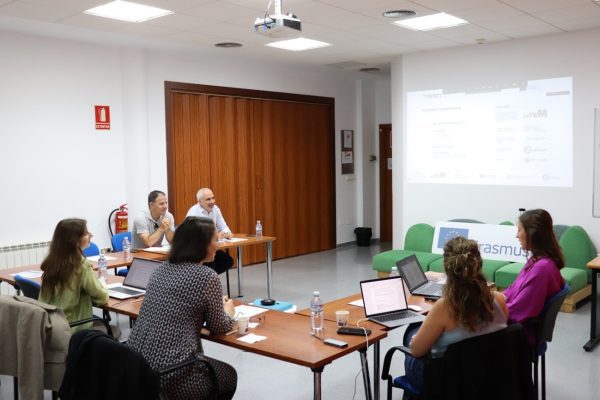The Technological Centre of Furniture and Wood of the Region of Murcia (CETEM) hosted last week an international exchange workshop that brings together European partners, local institutions and external stakeholders to advance collaboration in the fields of Industrial Symbiosis and Circular Economy.
The event took place on 30 September and 1 October at CETEM’s facilities in Yecla and combines in-person sessions with online participation. By hosting this international workshop, CETEM strengthened its position as a key European actor in innovation and sustainability. The event not only connected local and international stakeholders but also places Yecla at the centre of discussions on the future of Circular Economy and Industrial Symbiosis in Europe.
The workshop was part of the European INSET Project and marked a decisive moment in its development. The gathering had two main objectives. First, to close the results of Work Package 3, which has focused on capacity-building resources through the development and validation of the INSET Toolkit. This toolkit is designed to strengthen knowledge and practice in Industrial Symbiosis by providing practical resources to companies, policymakers and innovation actors.
Second, to launch Work Package 4, which centres on the creation of the Industrial Symbiosis Online Observatory. This new platform will act as a European reference point for mapping, categorizing and sharing best practices, tools, policy frameworks, and opportunities related to industrial symbiosis. Throughout the two days, partners from different regions and sectors were presenting results, exchanging methodologies and preparing the next steps for the design and validation of the Observatory.
A special highlight of the programme was the stakeholder workshop, in which the cluster AMUEBLA and the Valencia University were invited to share their perspectives. Their feedback will help to ensure that both the INSET Toolkit and the Observatory methodology are relevant, practical and aligned with real needs at both local and European level. In addition to technical sessions, the agenda also included a visit to CETEM’s facilities, giving participants the opportunity to learn first-hand about the centre’s innovative projects in the furniture and wood industries. Working sessions on communication, dissemination, and upcoming activities were also provided space to plan the next stages of the project.
